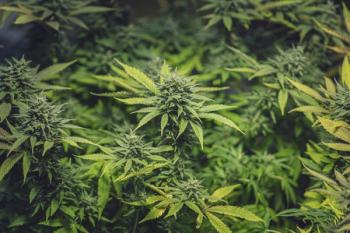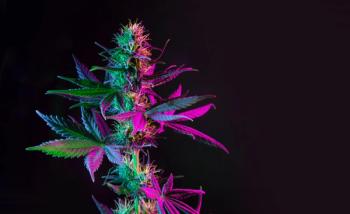
What CBD Brings to the Table for Dermatologic Concerns
Drug Topics® is joined by Dr. Alex Capano, Chief Science Officer at Ananda Professional to discuss what CBD is used for in dermatology.
Drug Topics®: Hello and welcome to Over the Counter, a podcast from Drug Topics®. In this episode, made in partnership with Ananda Professional, we're joined by Dr. Alex Capano, who is Chief Science Officer at Ananda Professional to discuss what CBD is used for in dermatology; interesting research findings about CBD and dermatology; and how to ensure that patients are getting effective counseling and CBD products, even when they don't visit the pharmacist’s counter.
What are some conditions that CBD is commonly used for in dermatology?
Alex Capano: It's commonly used for moisturizing skin, antiaging, anti-acne. and reducing inflammation, that's what I see day to day. And it makes sense to me, there was a study done in 2019, evaluating what benefits consumers saw in CBD products and it reflected pretty much what I just said. Number one was moisturizing, then there was a little bit about pain relief too, which does make sense, but it's just not something we typically think of when we talk about dermatology. Then it was about reducing inflammation, antiaging, and improving acne from there.
Drug Topics®: What are the signs that a product has an efficacious level of CBD?
Capano: Well, this is really about working with a company that has transparency and quality assurance, again. You want to make sure that they're actually putting the concentration of CBD on the label and that concentration in the industry is typically for what's in the entire product. In an ideal world and an ideal product, they also have what the level per serving or application is, so it's really, really clear. ‘Okay, this is a bottle with 1000 milligrams and for every mL, I'm going to have 20 milligrams of CBD.’ So people understand what they're using, what they're taking, and exactly what's in it. Because you can have this really, really high-volume product and it may have a lot of cannabinoids in it, but how much do you actually have to use to get something that's meaningful. So really look at the concentration of the product, and that should be transparent, very easy to understand.
For example, I was asked a couple of years ago to comment on an article that a beauty reviewer was writing for a CBD shampoo and look, CBD is not going to harm you in a shampoo, it's just not going to do anything. I said ‘ well, how much is in there?’ and she said ‘I don't know’. I said ‘well, you have to ask the company how many milligrams of CBD is in this?’ And she said ‘1%’ and I said ‘1% of what?’ She said they refuse to answer. That's a red flag and you products like that do exist. She did like the shampoo, by the way. She said it smelled really good. So wasn't going to hurt her, but they didn't even know how much CBD was in there. So you're certainly not going to have an efficacious level if that's who's manufacturing the product.
Drug Topics®: What forms of CBD are going to be most useful for treating dermatologic conditions?
Capano: Well, it depends on what your condition is. But we're talking topical CBD for dermatology, topical CBD at this point in history is not going to get into the bloodstream. This is topical. This is not transdermal. The rate limiting factor is the aqueous layer of the dermis, but it does actually interact with a lot of our different cells on our skin. So again, depending on the condition that you're trying to treat, you want to topical but you know what else is in that topical. If it's acne, you're trying to treat, you want something that's noncomedogenic. If you're treating something like psoriasis or eczema that's on a larger area of the body, you probably want something that's a bit easier to apply to a larger area and also has an emollient in it as well. If you're trying to treat dry skin on the face, you want to look at the other ingredients and delivery of that topical to see ‘do these also make sense?’ because it's not that you're applying only CBD to your skin, right? It's about the total formulation and what's in it to make sure that you're going to get the desired outcome and not negate it with the other ingredients in there.
Drug Topics®: What is known about how CBD helps dermatologic concerns?
Capano: Interestingly, CBD actually kills P acnes [Propionibacterium acnes] bacteria, for example. I sent our extract to a third-party lab in Silicon Valley a few years ago and had them test a lot of different pathogens, one of them being P acnes. It killed P acnes by log five, so 99.999% elimination. Then I asked them to do a serial passage study, which looks at the opportunity for the bacteria to mutate and then resist whatever's killing it and they found that there was no resistance. So this is a really nice thing to actually kill that bug and not worry about causing resistance, which we see with things like doxycycline and clindamycin.
In addition to that, we know that CBD increases the proliferation of skin cells. It helps with that turnover, which reduces the development of things like fine lines and it promotes apoptosis of unhealthy, damaged, or infected cells and we want that too. It reduces excess sebum production from sebaceous glands. This is something that not only can help with that desired antiaging effect and it's not going to dry the skin out like a benzoyl peroxide, but if there's an excess production of oil, or if there's P acnes bacteria that can cause blemishes, it's going to reduce that production.
It's an excellent anti-inflammatory agent and antioxidant as well. A recent study out of Basel, Switzerland was published in Molecules this year, found that CBD actually protects against UVA- and UVB-induced inflammation, and improves photo-aging, far better than vitamin C. That was really surprising to me, because vitamin C is sort of a champion skincare product right now, but CBD is superior to it in this study. It is shown to actually inhibit the free radical formation intracellularly and it was 1800-fold more potent than ascorbic acid or vitamin C. This is an antioxidant, anti-inflammatory, it's going to reduce those free radicals and really helped balance the skin.
Lastly, there's so much we know actually about CBD on the skin. I talked about P acnes bacteria, but things like Staph [Staphylococcus aureus], even MRSA Staph [methicillin-resistant S aureus] and Strep [Streptococcus] that colonizes on our skin and don't really cause an issue unless they get into a wound, rhat's a big problem and it's already resisting a lot of our typical treatments. I think we're going to see CBD as an option for wound healing over time, because it actually does improve healing and kill some of those bugs that can really cause infections in wounds, as well.
Drug Topics®: What questions about CBD and dermatologic care should be a research priority?
Capano: Wound healing! I do see a lot of evidence. I don't see a lot of application yet. I think we need more research on CBD and wound healing, specifically to decrease the development of resistant superbugs. There's also an opportunity for more research in skin malignancies. What exists right now in skin cancer eruptions or eruptions of malignancies that are not necessarily dermatological but have a dermatological component, most of the evidence is promising, but there's some evidence that shows a negative impact. So, I think we really need to know: is it helpful; is it benign or does it hurt; and how do we define those buckets to understand where it's a therapeutic opportunity; If it's a therapeutic opportunity; or if it's something that's really a contraindication. I think we need more research there.
Drug Topics®: What research uncovered about CBD and dermatologic care that you consider to be surprising?
Capano: Oh, hair growth! Several years ago, I gave a lecture and a pharmacist came up to me afterwards and he said ‘I really like your products, and I've been using them and my alopecia, male pattern baldness improved, my hair grew back.’ And I said ‘oh, I'm so happy for you. I don't think it was the CBD. I think it's unrelated, but you know, congratulations.’ Then I started to really look into it and more data came out and then we actually did our own study. It does, in fact, improve hair growth and fullness. It's really tricky, because it's dose dependent. If you use too much, topically on the scalp, it can potentially reduce hair growth. You have to make sure that you're working with people who understand how to dose it and exactly tell you how to use it. But it can, in fact, improve hair growth and thickness and fullness. So, I owe an apology to that fellow who gave me that idea and I said ‘it's not the CBD’ because it probably actually was.
Drug Topics®: How can pharmacies ensure that patients have the chance to get counseling for CBD dermatology products, especially when many can often be found in sections of pharmacies that are far away from the pharmacy counter?
Capano: Well, I say this of all CBD products, certainly for dermatology, you have to make it a priority to make sure your whole team, not just the pharmacists, that the whole team understands what they're selling, what's on their shelves. Educating everyone, whether they're working as the cashier or they're in the pharmacy. Everyone in your store, I think really needs to be educated on what this is, so they can answer questions, they can make recommendations. Beyond that be thoughtful about merchandising, and really creating an experience for the shopper. Even having things like pamphlets or handouts that are right there that describe: what this is, why you use it, and gets people interested at the shelf, I think is really helpful. Then hopefully they can have that conversation, even if it's not at the pharmacy, but someone working in the pharmacy, that's why everyone should be educated on what these are and why people use them.
It sounds like a lot, a lot of work, right? And everyone's really busy. It goes back to finding a brand that is going to help you achieve that and make it easy and not time consuming and not pull from your resources, and really just add to them. For example, I know, Ananda Professional, they have a whole suite of digital papers, live education opportunities that people can do on their own time. They can do them in little bite sized pieces. They can go and get a little refresher and be that champion in the store. Hopefully, everyone can do that. It's not time consuming. It's made for different levels of expertise or scientific rigor. So again, someone does not have to be a pharmacist to understand this. Companies like Ananda Professional will make those merchandising suggestions for you. They'll help you to execute it and give you those point-of-sale tools that you can have, where the patient can pick it up and it piques their interest without you having to have that interaction. There's a lot of different ways to do it. I think the investment pays off. And if you find a company who's really going to work with you to do that, then it just it takes the job away from you, so you can focus on everything else in the pharmacy.
Drug Topics®: And as always, thank you for listening and we hope to see you next time at the counter.
Newsletter
Pharmacy practice is always changing. Stay ahead of the curve with the Drug Topics newsletter and get the latest drug information, industry trends, and patient care tips.























